10 Best Pre-Recorded Video Interview Tools to Streamline Hiring in 2025
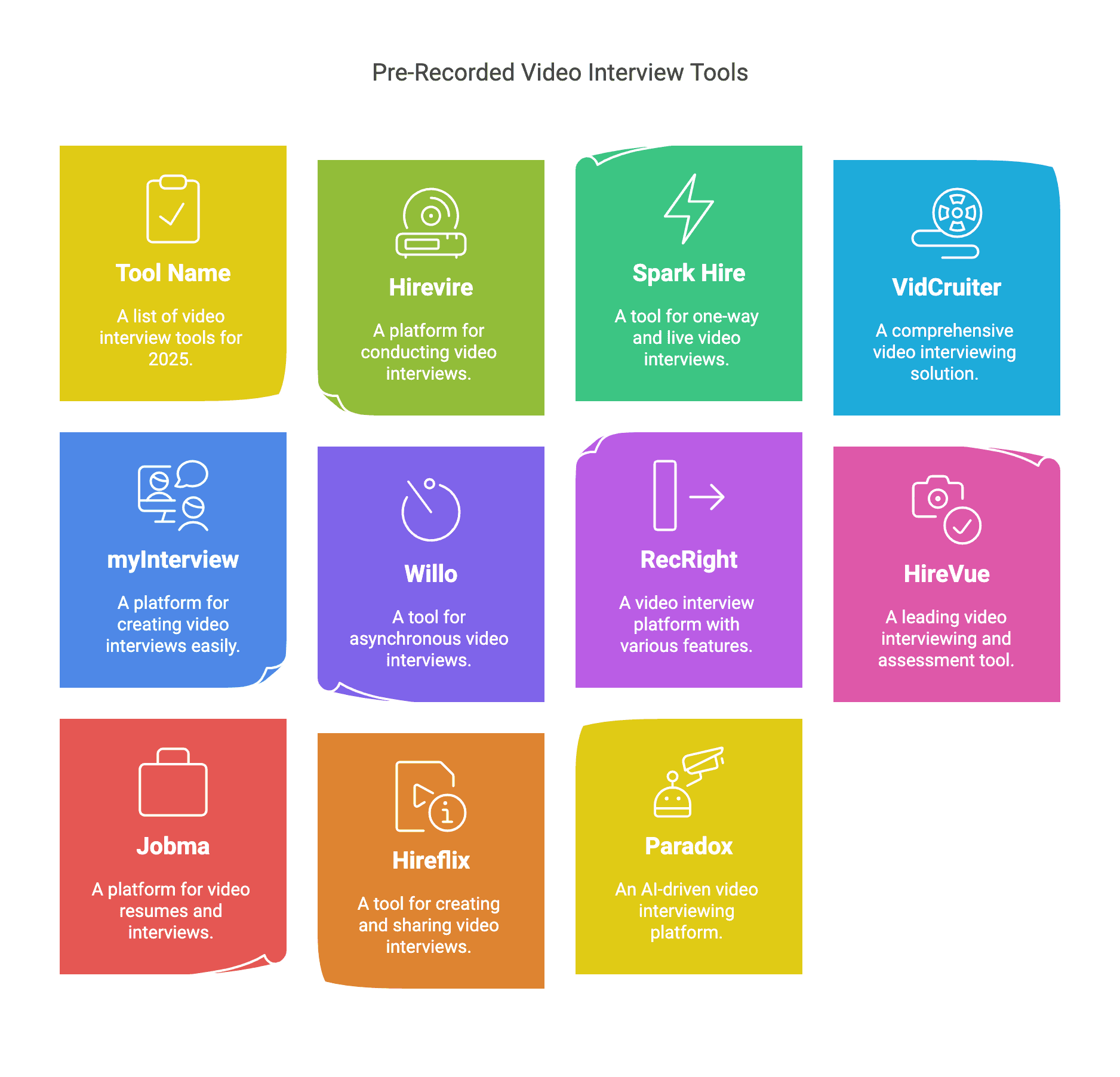
Picture this: Your recruitment team is drowning in scheduling conflicts, spending endless hours on initial screening calls, and watching your best candidates get snapped up by faster-moving competitors. Sound familiar? If you're nodding your head, you're not alone.
The recruitment landscape has evolved dramatically in recent years, and pre-recorded video interview tools have emerged as the secret weapon for forward-thinking hiring teams.
What exactly are pre-recorded video interviews?
Also known as asynchronous or one-way interviews, these are digital interactions where candidates respond to your questions on video at their convenience—no scheduling required. The recruiter can then review these responses anytime, anywhere, creating a flexible and efficient screening process.
The Growing Impact of Video in Recruitment
The numbers tell a compelling story:
- According to Monster's research, 80% of candidates better understand job opportunities through video content
- CareerBuilder reports a remarkable 34% increase in applications when job postings include video elements
- Lighthouse Research found that 46% of candidates are more likely to consider jobs using video in their hiring process
Meanwhile, recruiters continue to face mounting pressures, with LinkedIn reporting that recruiters still spend 78% of their hiring time on administrative tasks like scheduling and coordination.
The Business Case for Pre-Recorded Video Interviews
The financial implications are equally impressive:
- Organizations using AI-powered recruitment tools report a 75% reduction in time-to-hire
- The average cost-per-hire hovers around $4,700 according to SHRM, with pre-recorded interview tools significantly reducing this figure
- Deloitte's research reveals teams using AI recruitment technology boost their productivity by 40%
- The cost of a bad hire can reach 213% of annual salary for senior positions, making quality screening essential
For hiring managers, talent acquisition specialists, and HR leaders, these tools are no longer a luxury—they're a competitive necessity in a fast-moving talent market.
Market Growth and Adoption
The explosive growth in this sector speaks volumes:
- The video interviewing software market is projected to grow from $250.06 million in 2022 to a staggering $891.86 million by 2030
- This represents a 17.2% compound annual growth rate, reflecting widespread adoption across industries
- According to McKinsey's Workplace Analysis, remote hiring has increased by 135% since 2023, further accelerating the need for digital interviewing solutions
In this comprehensive guide, we'll examine the top 10 pre-recorded video interview tools available in 2025, comparing their features, pricing, and use cases to help you make an informed decision. Whether you're a startup looking to scale your hiring process or an enterprise organization aiming to streamline recruitment operations, you'll find valuable insights to guide your choice.
Let's dive into the solutions that are reshaping recruitment in 2025 and beyond.
The Evolution of Recruitment Screening
The landscape of recruitment screening has undergone a dramatic transformation in recent years. What began as simple face-to-face interviews has evolved into a sophisticated, technology-driven process that prioritizes both efficiency and candidate experience.
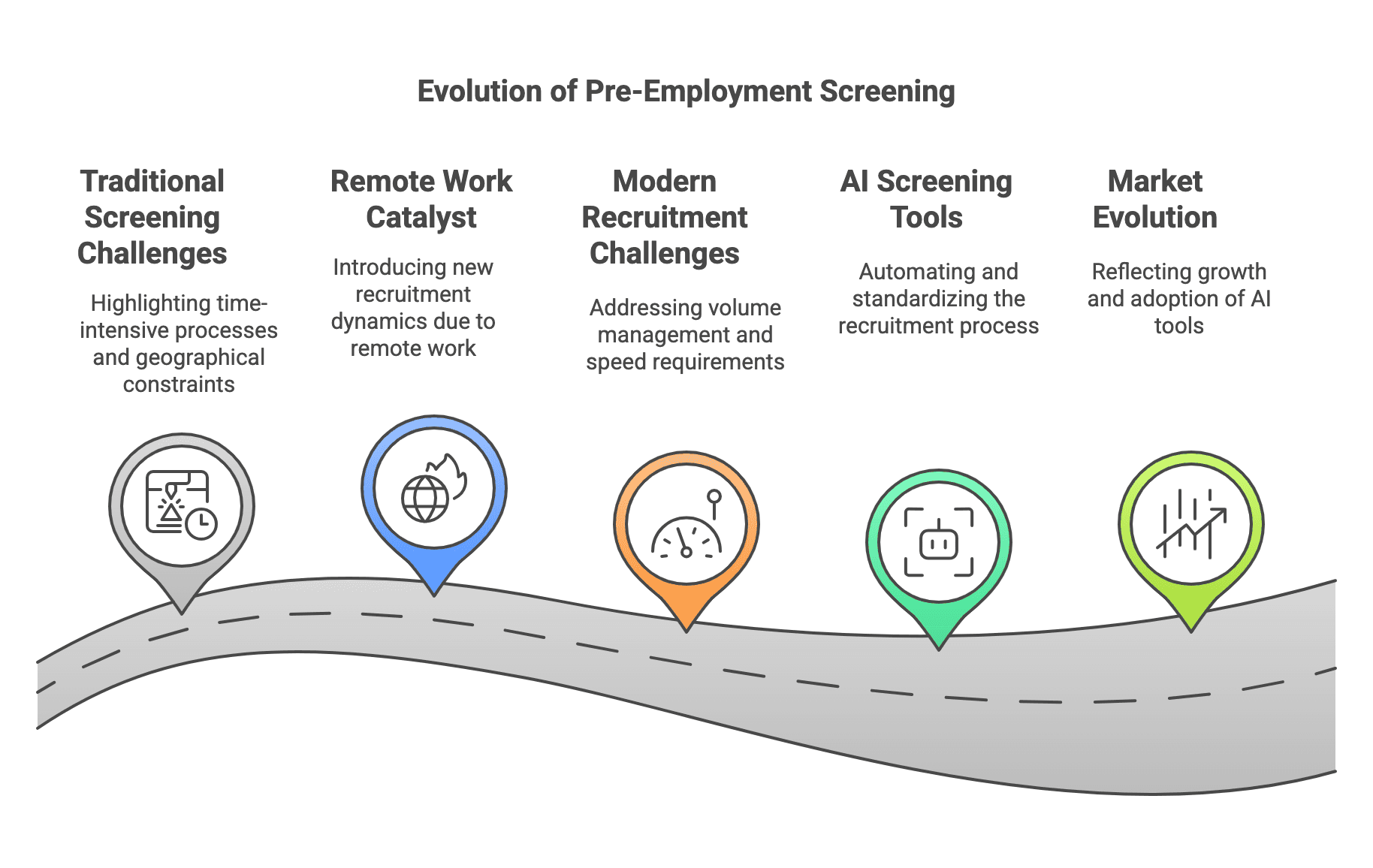
Traditional Screening Challenges
Traditional recruitment screening methods have long been plagued by several key limitations:
Time-Intensive Process - HR managers typically spend 30-40% of their work week coordinating and conducting initial screening calls. These preliminary conversations, while necessary, often follow similar patterns and ask the same basic questions across candidates.
Geographical Constraints - Physical interviews and real-time phone screenings limit access to global talent pools. With remote work becoming increasingly prevalent, these limitations have become more pronounced than ever.
Inconsistent Evaluation - Without standardized processes, different interviewers might assess candidates based on varying criteria, leading to potential bias and uneven evaluation standards.
Resource Drain - The need to coordinate schedules between hiring managers, recruiters, and candidates creates a significant administrative burden, especially for growing organizations managing multiple open positions simultaneously.
The Remote Work Catalyst
The global shift toward remote work has fundamentally changed recruitment dynamics. Organizations now face new challenges:
- Managing candidates across multiple time zones
- Evaluating communication skills in virtual environments
- Assessing cultural fit without in-person interaction
- Handling increased application volumes due to geographical barriers being removed
Modern Recruitment Challenges
Today's recruiters face a unique set of challenges that traditional methods struggle to address:
Volume Management - With job postings reaching wider audiences than ever, recruiters need efficient ways to process large numbers of applications without sacrificing quality assessment.
Skills Verification - Remote positions require specific soft skills like self-motivation and virtual communication abilities that are difficult to evaluate through traditional methods.
Speed Requirements - The competitive job market demands faster hiring decisions while maintaining thorough evaluation processes.
Candidate Experience - Modern candidates expect a streamlined, professional, and respectful application process that values their time.
How Pre-Recorded Video Interviews Address These Challenges
Pre-recorded video interview solutions have emerged as the answer to these modern recruitment challenges:
Automated Initial Assessment - These tools can process hundreds of applications quickly, identifying qualified candidates based on predetermined criteria and standardized questions.
Standardized Evaluation - Through structured video interviews and consistent questioning, these platforms ensure all candidates receive equal consideration.
Enhanced Accessibility - Asynchronous video interviews allow candidates to participate in the screening process at their convenience, eliminating scheduling conflicts and timezone constraints.
Data-Driven Decisions - Pre-recorded video interview tools provide measurable insights into candidate performance, helping make more objective hiring decisions.
This evolution in recruitment screening technology has set new standards for what organizations can expect from their hiring processes:
✅ Reduced time-to-hire
✅ Improved candidate quality
✅ Better resource allocation
✅ Enhanced candidate experience
✅ Consistent evaluation methods
As we examine the top pre-recorded video interview tools available in 2025, it's crucial to understand how each solution addresses these evolving needs while preparing organizations for future recruitment challenges.
Key Benefits of Pre-Recorded Video Interview Software
Pre-recorded video interview software has revolutionized the recruitment process by providing tangible benefits for both employers and candidates. Understanding these advantages helps organizations appreciate why these tools have become essential components of modern hiring strategies.
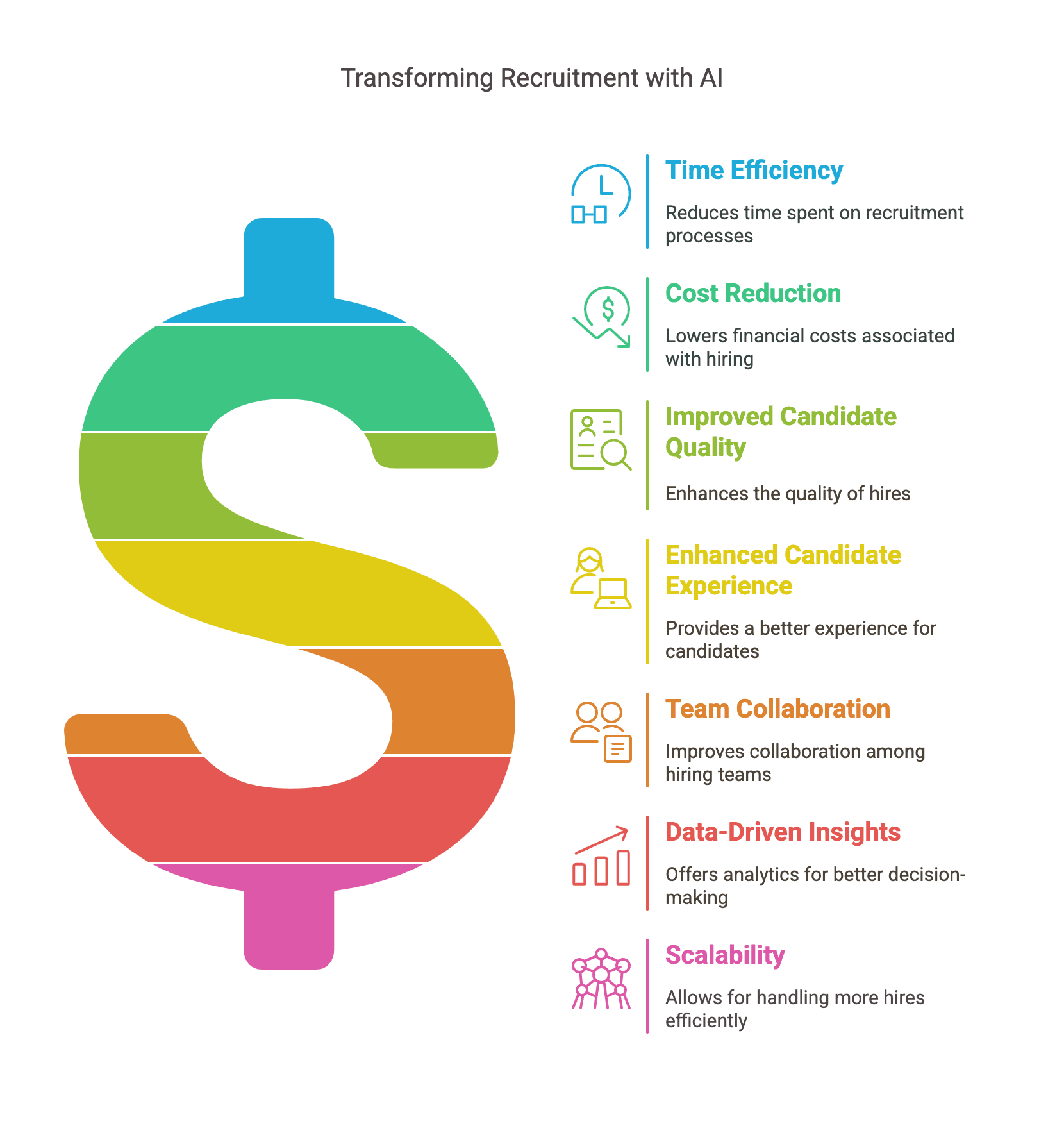
Time Efficiency and Resource Optimization
Elimination of Scheduling Coordination
Pre-recorded video interviews completely remove the scheduling puzzle that plagues traditional recruitment. Instead of:
- Coordinating availabilities across multiple time zones
- Managing calendar conflicts
- Dealing with last-minute cancellations
- Rescheduling no-shows (which can account for up to 15% of scheduled interviews)
Recruiters can send interview invitations and candidates can complete them at their convenience, creating a frictionless process for both parties.
Dramatic Time Savings
The efficiency gains are substantial:
- 67% reduction in screening time per candidate
- 75% decrease in time spent on résumé reviewing
- 36% time savings on interview scheduling
- 50% reduction in overall time-to-hire
A recruitment team screening 100 candidates monthly can reclaim approximately 80-100 hours—time that can be redirected toward strategic initiatives and candidate relationship building.
Cost Reduction and ROI
Lower Recruitment Expenses
The financial impact of implementing pre-recorded video interviews is compelling:
- 40-60% reduction in recruitment costs
- 50% decrease in cost-per-hire
- Minimized overtime expenses for recruitment teams
- Reduced dependency on external agencies and contractors
For organizations hiring at scale, these savings quickly translate into thousands—sometimes millions—of dollars annually.
Improved Hire Quality
Beyond direct cost savings, these tools contribute to better hiring decisions:
- 46% higher likelihood of successful hires when using AI in the hiring process
- Reduced turnover costs (which can reach 213% of annual salary for senior positions)
- Lower training and onboarding expenses for replacement hires
- Minimized productivity loss during position vacancies
Enhanced Candidate Experience
Candidate Convenience
Modern job seekers appreciate the flexibility of pre-recorded interviews:
- No need to take time off from current positions for initial screenings
- Ability to record responses when they're at their best
- Multiple recording attempts to perfect their answers
- Elimination of travel time and expenses
Professional Impression
These platforms also help create a positive employer brand impression:
- Structured, consistent process signals organizational efficiency
- Technology adoption demonstrates modern workplace culture
- Faster response times show respect for candidate time
- Better communication through automated updates
Research shows that 57% of job seekers say that company culture content is crucial in their decision to apply, and video platforms help showcase this aspect effectively.
Standardization and Fairness
Consistent Evaluation
Pre-recorded video interviews standardize the screening process:
- All candidates answer the same questions
- Structured evaluation criteria ensure fair assessment
- Multiple team members can evaluate the same responses
- Side-by-side candidate comparison becomes possible
Bias Reduction
These platforms help minimize unconscious bias:
- Focus on job-relevant responses rather than first impressions
- Blind screening options in advanced platforms
- AI-powered objective assessment tools
- Structured interview formats proven to reduce bias
Global Talent Access
Borderless Recruitment
Pre-recorded video interviews break down geographical barriers:
- Access to worldwide talent pools without travel costs
- 24/7 screening capability across all time zones
- Multilingual support (with some platforms offering 90+ languages)
- Cultural fit assessment for remote global teams
Diverse Candidate Pools
Organizations report significant improvements in diversity metrics:
- 3x increase in candidate pool diversity
- Improved accessibility for candidates with scheduling constraints
- Accommodation for different work schedules and personal responsibilities
- Equal opportunity for candidates regardless of location
Data-Driven Decision Making
Rich Analytical Insights
Modern platforms provide valuable recruitment metrics:
- Completion rate analysis
- Response quality evaluation
- Time-to-decision tracking
- Candidate progression patterns
Performance Prediction
Advanced systems offer predictive capabilities:
- AI-powered assessment of candidate potential
- Skills-based matching algorithms
- Cultural fit indicators
- Retention likelihood scoring
These comprehensive benefits explain why organizations using video interviewing report a 50% reduction in time-to-fill positions and a 70% decrease in interview scheduling time. As we examine the top tools in this space, we'll see how each platform addresses these key advantage areas.
How to Choose the Right Pre-Recorded Video Interview Platform
Selecting the ideal pre-recorded video interview platform for your organization requires careful consideration of several key factors. This decision framework will help you navigate the options and find the solution that best matches your specific recruitment needs.
Essential Features to Consider
Technical Requirements
When evaluating platforms, start by assessing these technical aspects:
Platform Compatibility
- Browser and device support
- Mobile responsiveness
- Bandwidth requirements
- Upload/download capabilities
Integration Capabilities
- Compatibility with your existing ATS
- Job board connections
- HRIS system integration
- Calendar syncing options
Security and Compliance
- Data encryption standards
- GDPR compliance
- SOC 2 certification
- Access control mechanisms
Data Storage and Privacy
- Video retention policies
- Candidate data protection
- Compliance documentation
- Security audit history
Core Functionality
Next, evaluate the essential features that directly impact your screening process:
Video and Response Quality
- Recording resolution options
- Audio clarity
- Playback controls
- Download capabilities
Customization Options
- Branding elements
- Question customization
- Evaluation rubrics
- Response time limits
Candidate Experience
- User interface intuitiveness
- Login requirements (or lack thereof)
- Re-recording options
- Technical support for candidates
Language Support
- Multilingual interface
- Translation capabilities
- Transcription services
- Global accessibility features
User Experience
Consider how the platform will be used by your recruitment team:
Ease of Implementation
- Setup complexity
- Integration requirements
- Migration from existing systems
- Initial configuration time
Interface Intuitiveness
- Learning curve for recruiters
- Dashboard organization
- Navigation simplicity
- Mobile access for reviewers
Training Requirements
- Available resources
- Documentation quality
- Onboarding support
- Knowledge base access
Budget Considerations
Cost Structure Evaluation
Understand the financial implications of your platform choice:
Pricing Models
- Subscription-based vs. pay-per-use
- User-based vs. volume-based
- Tiered feature access
- Annual vs. monthly billing
Additional Costs
- Implementation fees
- Training expenses
- Premium feature access
- Storage limitations
Scalability Pricing
- Cost changes as team grows
- Volume discount thresholds
- Enterprise options
- Contract flexibility
ROI Factors
Calculate potential return on investment by considering:
Time Savings
- Hours saved per hire
- Reduction in scheduling time
- Administrative task automation
- Faster decision-making process
Quality Improvements
- Better candidate matching
- Reduced mis-hires
- Improved retention metrics
- Enhanced team collaboration
Cost Reductions
- Lower cost-per-hire
- Decreased turnover expenses
- Reduced agency dependencies
- Minimized overtime costs
Implementation Requirements
Technical Setup
Prepare for the implementation process by evaluating:
Timeline Expectations
- Typical setup duration
- Configuration requirements
- Integration complexity
- Testing period
IT Resource Needs
- Internal support requirements
- Technical expertise needed
- Ongoing maintenance
- Troubleshooting capabilities
Data Migration
- Importing existing candidates
- Historical data transfer
- Template conversion
- Process transition
Team Adoption
Plan for successful organizational adoption:
Change Management
- Team communication plan
- Process transition strategy
- Stakeholder buy-in
- Success metrics definition
Training Strategy
- User training programs
- Administrator training
- Hiring manager orientation
- Candidate instruction resources
Rollout Planning
- Pilot program approach
- Phased implementation
- Department prioritization
- Feedback collection mechanisms
Growth Considerations
Ensure your chosen platform can grow with your organization:
User Scaling
- Additional user costs
- Permission management
- Role-based access control
- Team collaboration features
Volume Capacity
- Candidate volume limitations
- Concurrent interview capabilities
- Performance under load
- Batch processing options
Feature Expansion
- Upgrade pathways
- Advanced feature access
- Enterprise options
- Development roadmap
Decision Criteria Checklist
Before making your final platform selection, ensure you've evaluated these critical aspects:
Immediate Needs Assessment
- Current hiring volume
- Existing pain points
- Must-have vs. nice-to-have features
- Budget constraints
Long-term Vision Alignment
- Growth projections
- Future integration needs
- Feature evolution requirements
- Scalability expectations
Support Requirements
- Available support channels
- Response time guarantees
- Training resources
- Community access
Risk Management
- Vendor stability
- Data security measures
- Backup and redundancy
- Service level agreements
By methodically evaluating these factors against your organization's specific needs, you can identify the pre-recorded video interview platform that offers the optimal combination of features, usability, and value. In the following section, we'll examine the top 10 platforms available in 2025 to help narrow your selection.
Top 10 Pre-Recorded Video Interview Tools for 2025
In this comprehensive review, we examine the leading pre-recorded video interview platforms available in 2025. Each tool has been evaluated based on features, pricing, ease of use, and overall value to help you identify the best fit for your organization's recruitment needs.
1. Hirevire
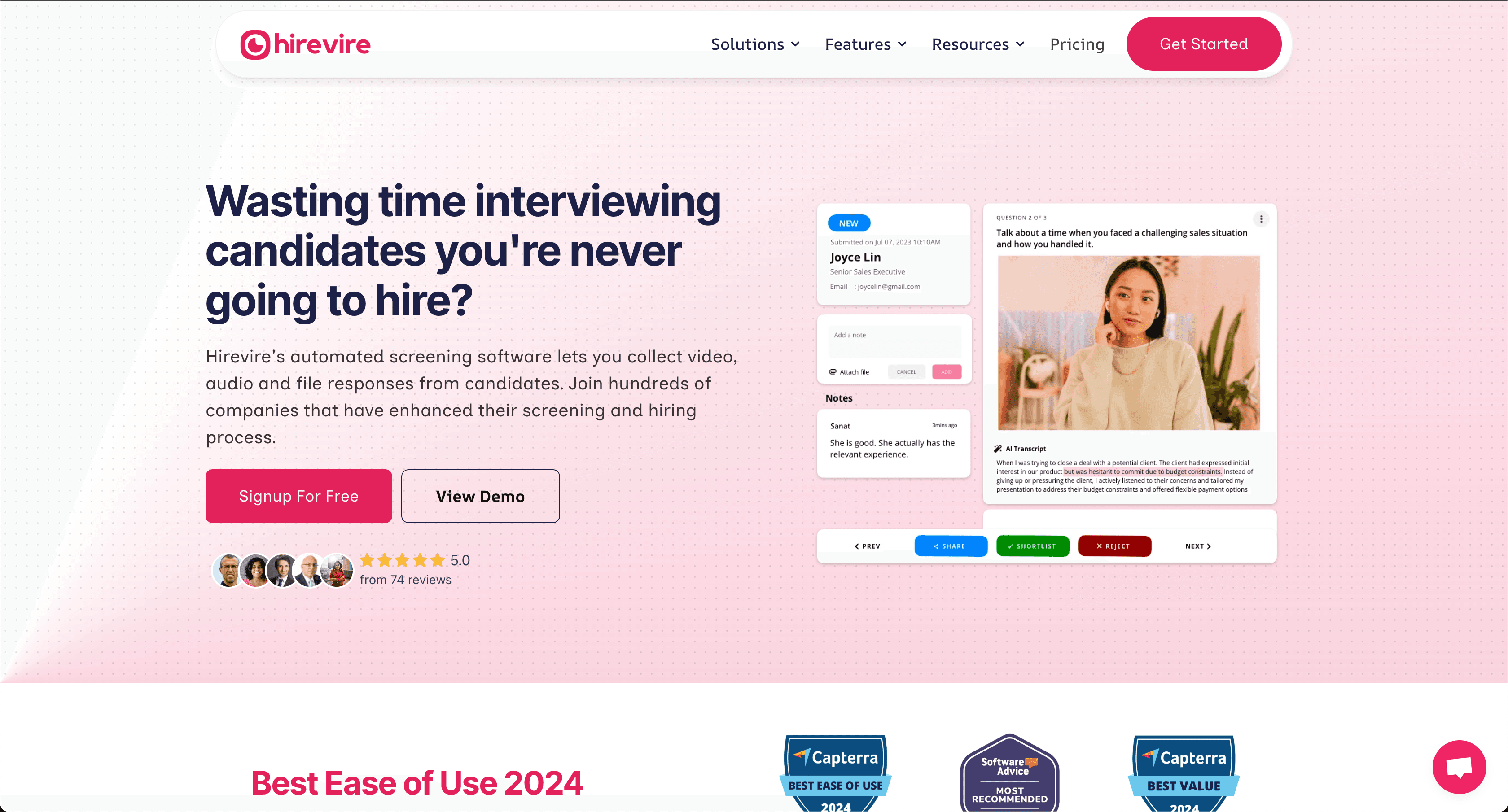
Overview & Core Offering
As a frontrunner in the AI screening space, Hirevire has revolutionized the recruitment process by offering a comprehensive screening automation platform. Their approach to asynchronous video, audio, and file-based interviews has made them particularly popular among growing companies looking to streamline their hiring process.
Key Features
- Multi-format response collection (video, audio, text, file uploads)
- AI transcription support for 90+ languages
- No login required for candidates with unlimited response attempts
- Advanced customization and branding options
- Automated email workflows
- Robust integration capabilities via Zapier (5000+ apps) and Make (2000+ apps)
- Custom career page builder with shareable application links
Pricing Structure
- Starting at $19/month (billed annually)
- Professional plan: $49/month
- Significantly more affordable than competitors
- Unlimited responses included in all plans
- Custom enterprise pricing available
Primary Use Cases
- High-volume recruitment screening
- Remote candidate assessment
- Technical role evaluations
- Cultural fit assessment
- Agency recruitment
Integration Capabilities
- Native integrations with popular ATS platforms
- Zapier and Make integration support
- Webhook functionality
- Custom domain support
- Gmail integration
Pros and Cons
✅ Pros
- Highly competitive pricing
- User-friendly interface for both recruiters and candidates
- Comprehensive integration options
- No login required for candidates
- Excellent customer support
- Custom branding capabilities
❌ Cons
- Limited advanced analytics in basic plan
- Some advanced features require higher-tier plans
Best Suited For
- Growing startups
- SMBs with active hiring needs
- Recruitment agencies
- Companies prioritizing cost-effective solutions
- Organizations with international hiring needs
Customer Testimonial "Hirevire's AI transcription has been a game-changer for our international recruitment. We've cut our screening time by 60% while improving candidate evaluation quality." - Sarah Chen, HR Manager at GrowthTech Solutions
2. Spark Hire
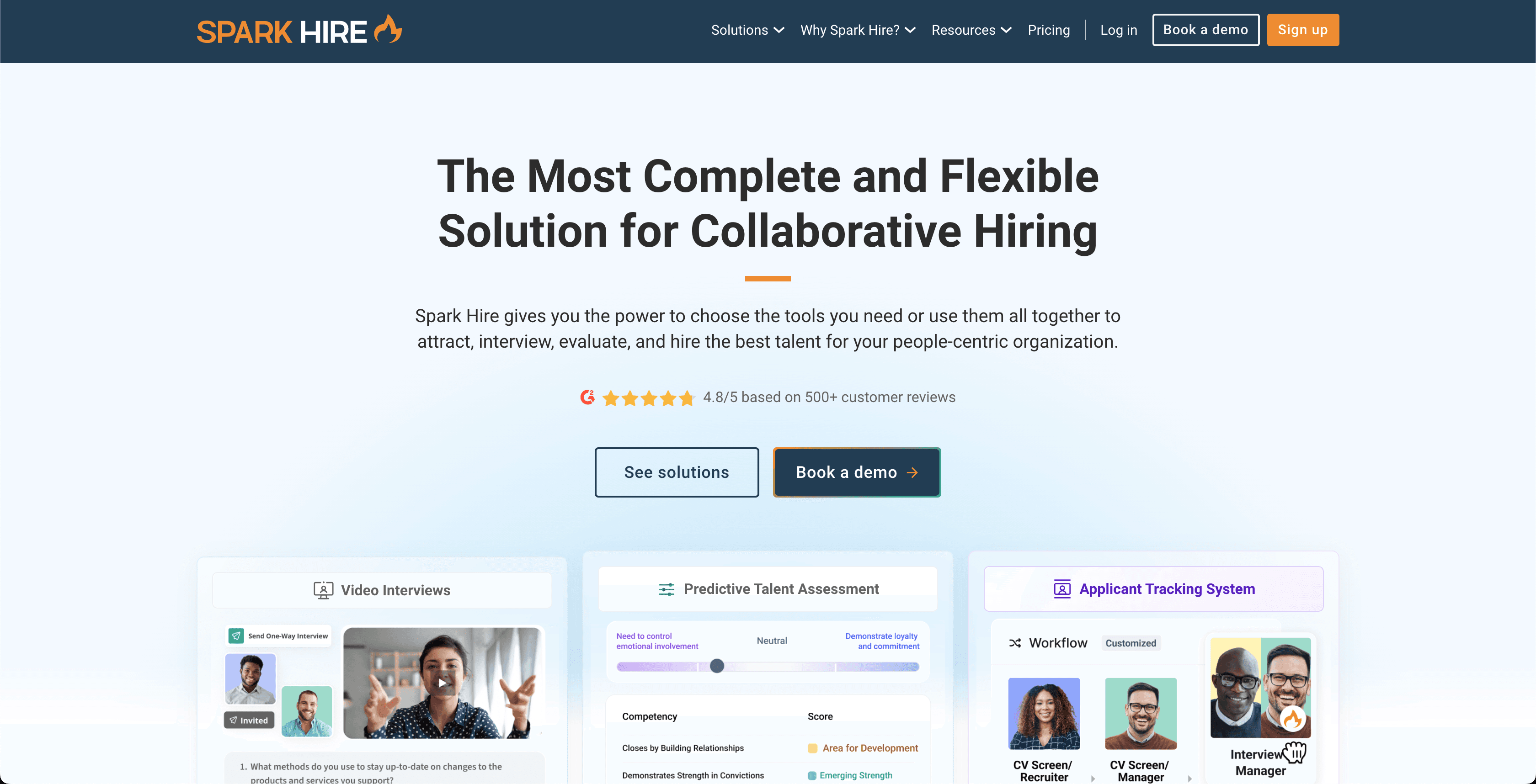
Overview & Core Offering
A leading platform in enterprise video interviewing, Spark Hire specializes in providing comprehensive hiring solutions for larger organizations seeking robust recruitment tools.
Key Features
- Live and pre-recorded video interviews
- Collaborative evaluation tools
- Custom branded interviews
- Advanced scheduling system
- Mobile app functionality
- Enterprise-grade security
- Comprehensive analytics dashboard
Pricing Structure
- Basic plan starts at $149/month
- Professional and Enterprise tiers available
- Custom pricing for large teams
- Annual contracts required
Primary Use Cases
- Enterprise-level recruitment
- High-volume hiring campaigns
- Corporate talent acquisition
- Global team expansion
- Agency recruitment operations
Integration Capabilities
- Extensive ATS integrations
- Calendar synchronization
- Enterprise email integration
- Custom API access
- SSO authentication
Pros and Cons
✅ Pros
- Robust enterprise features
- Comprehensive reporting
- Advanced security measures
- Excellent scalability
- Global support coverage
❌ Cons
- Higher price point
- Complex setup process
- Less suitable for small businesses
- Steep learning curve
Best Suited For
- Large enterprises
- Corporate HR departments
- International organizations
- Companies with substantial hiring budgets
Customer Testimonial "Spark Hire transformed our enterprise hiring process with its robust features and scalability." - Enterprise HR Director at a Fortune 500 company
3. VidCruiter
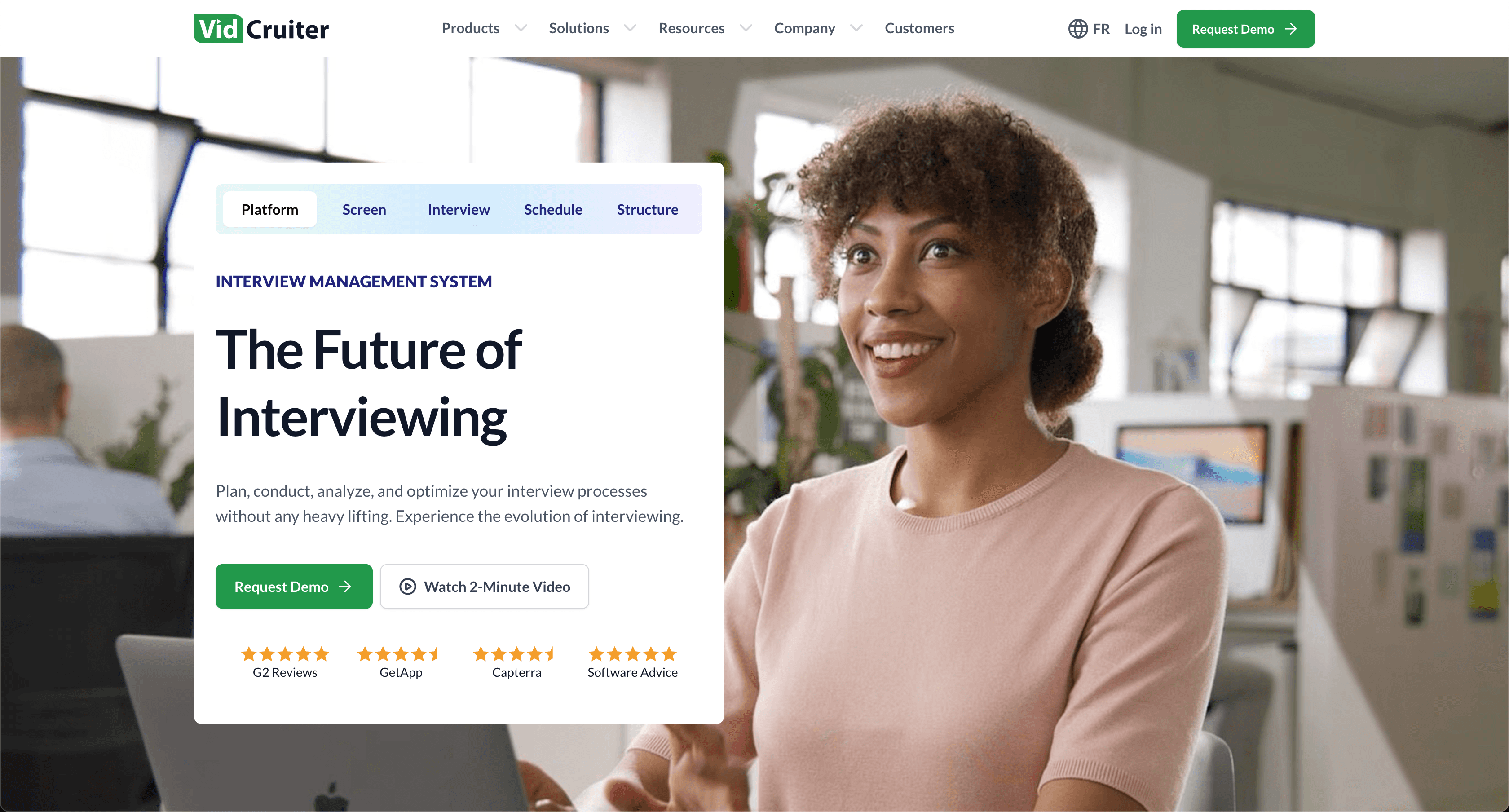
Overview & Core Offering
VidCruiter provides a comprehensive video interviewing platform with a strong focus on structured hiring processes and compliance standards for mid to large-sized organizations.
Key Features
- Structured digital interviews
- AI-driven candidate scoring
- Automated scheduling system
- Custom workflow builder
- Skills assessment tools
- Multi-language support
- Compliance tracking
Pricing Structure
- Custom pricing based on organization needs
- Modular feature selection
- Volume-based pricing available
- Enterprise packages offered
Primary Use Cases
- Structured hiring processes
- Compliance-focused recruitment
- Technical role assessment
- Large-scale hiring initiatives
- Government and healthcare recruitment
Integration Capabilities
- Major ATS integrations
- HRIS system compatibility
- Custom API access
- SSO implementation
- Calendar synchronization
Pros and Cons
✅ Pros
- Highly customizable workflows
- Strong compliance features
- Advanced assessment tools
- Excellent security measures
❌ Cons
- Higher price point
- Complex implementation
- Requires significant setup time
- May overwhelm smaller teams
Best Suited For
- Mid to large enterprises
- Government organizations
- Healthcare institutions
- Compliance-focused industries
Customer Testimonial "VidCruiter's structured approach has significantly improved our technical hiring process." - Senior Technical Recruiter at a healthcare organization
4. myInterview
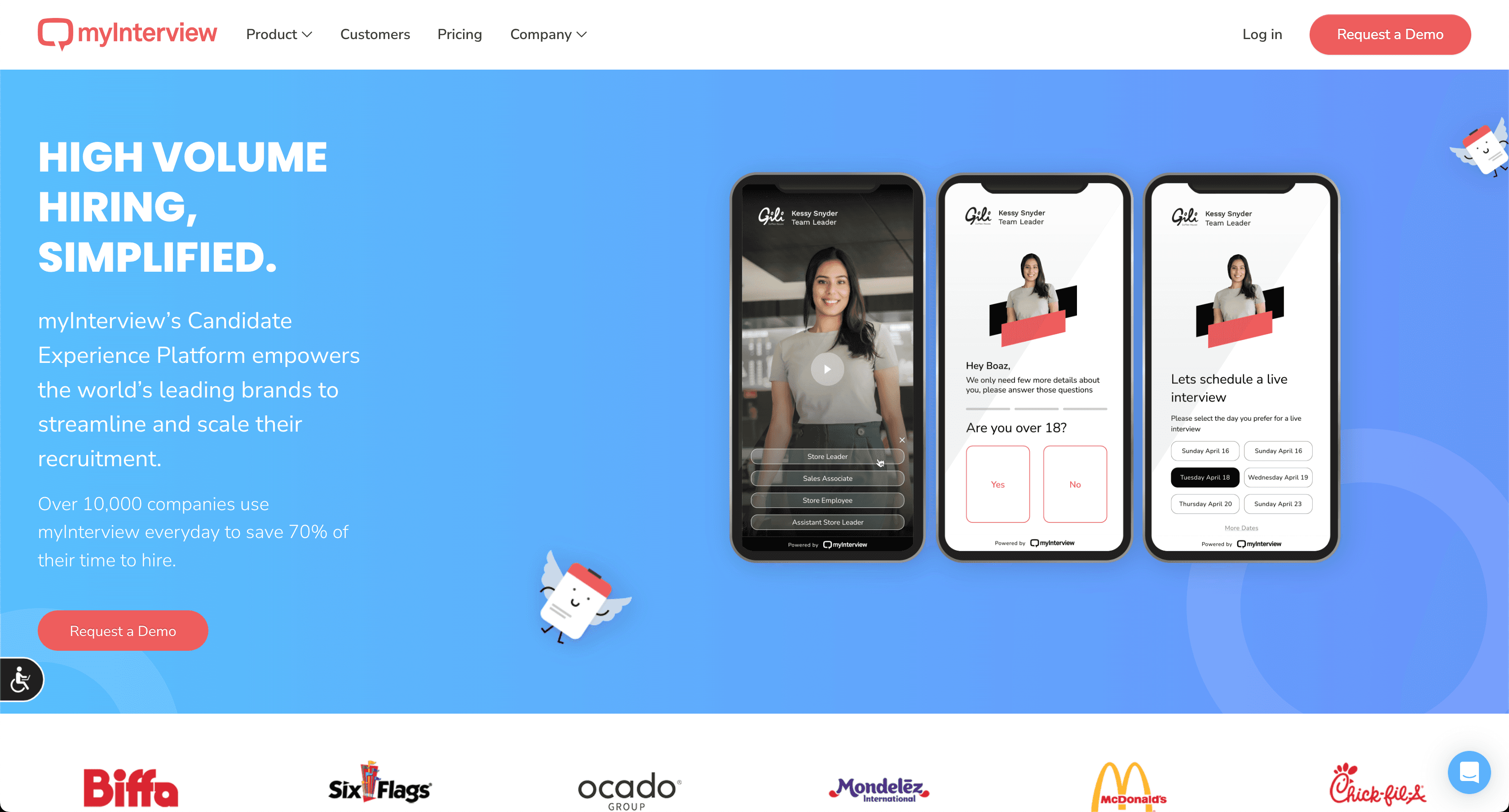
Overview & Core Offering
myInterview offers a user-friendly video interviewing platform designed specifically for small to medium-sized businesses seeking an accessible solution.
Key Features
- AI-powered candidate insights
- Simple video recording
- Basic question library
- Team collaboration tools
- Integration capabilities
- Mobile-friendly interface
Pricing Structure
- Free starter plan available
- Pro plan: $39/month
- Business plan: Custom pricing
- Monthly billing options
Primary Use Cases
- SMB recruitment
- Startup hiring
- Remote team building
- Initial candidate screening
- Culture fit assessment
Integration Capabilities
- Basic ATS integrations
- Email system connectivity
- Calendar integration
- Simple sharing options
Pros and Cons
✅ Pros
- Free tier available
- User-friendly interface
- Quick implementation
- Affordable pricing
❌ Cons
- Limited advanced features
- Basic analytics only
- Restricted customization
- Limited enterprise features
Best Suited For
- Small businesses
- Startups
- Non-profit organizations
- Companies with basic hiring needs
Customer Testimonial "Perfect for our startup's hiring needs - simple, effective, and budget-friendly." - Founder of an emerging tech startup
5. Willo
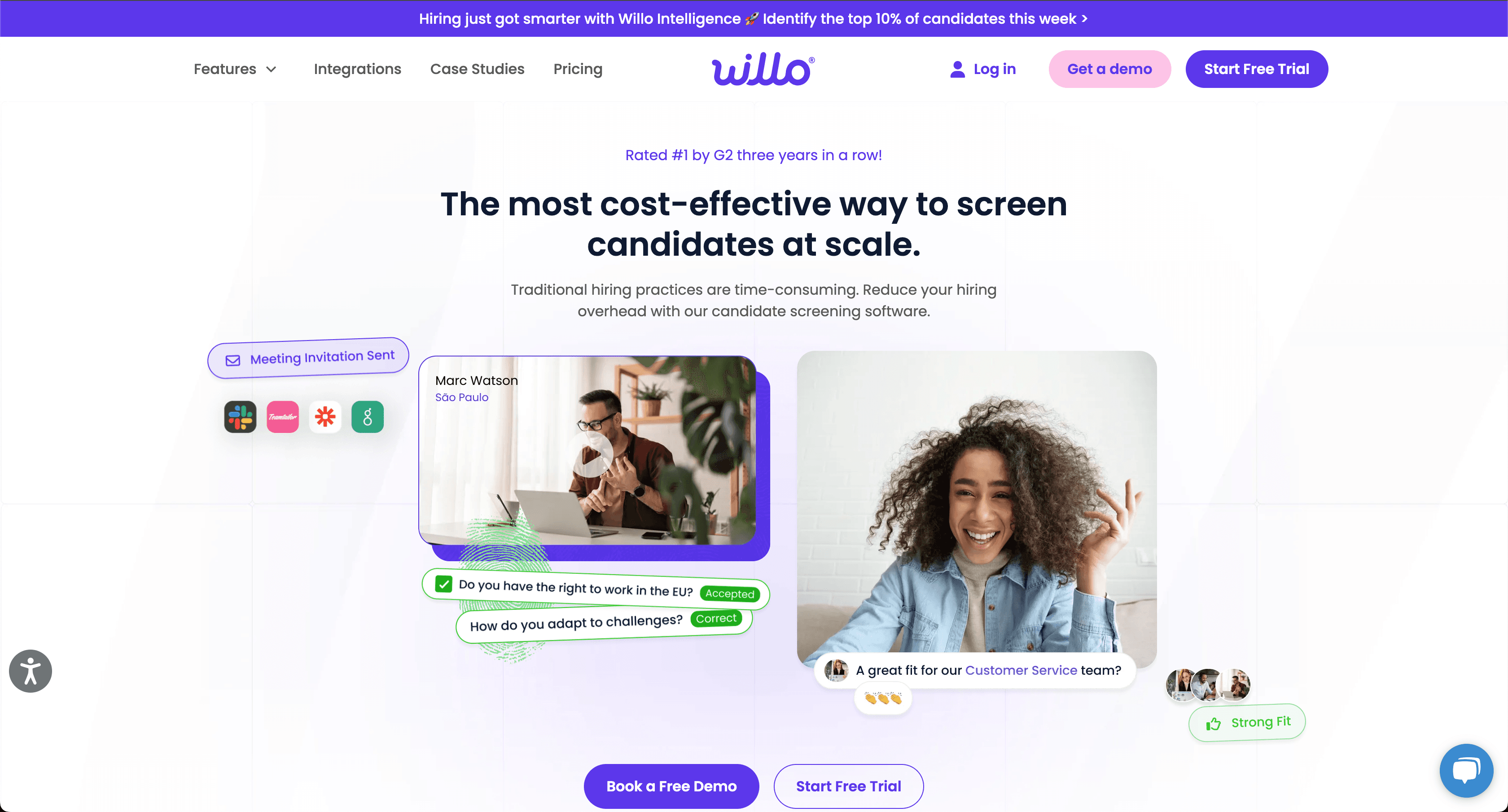
Overview & Core Offering
Willo specializes in asynchronous video interviewing with a focus on simplicity and ease of use, making it particularly attractive for remote-first companies.
Key Features
- Pre-set interview templates
- Simple video recording interface
- Team collaboration tools
- Basic customization options
- Quick sharing capabilities
- Template library
- Mobile optimization
Pricing Structure
- Starts at $70/month
- Team plans available
- Custom enterprise pricing
- Flexible billing options
Primary Use Cases
- Remote team hiring
- Basic screening processes
- Small team collaboration
- International recruitment
- Quick hiring needs
Integration Capabilities
- Basic ATS connections
- Email integration
- Simple sharing tools
- Calendar sync options
Pros and Cons
✅ Pros
- Clean, simple design
- Quick setup process
- Good for remote teams
- Intuitive interface
❌ Cons
- Limited advanced features
- Basic integration options
- Minimal customization
- Limited analytics
Best Suited For
- Remote-first companies
- Small businesses
- Digital agencies
- Startups
Customer Testimonial "Willo simplified our remote hiring process with its straightforward approach." - Remote Team Manager at a digital marketing agency
6. RecRight
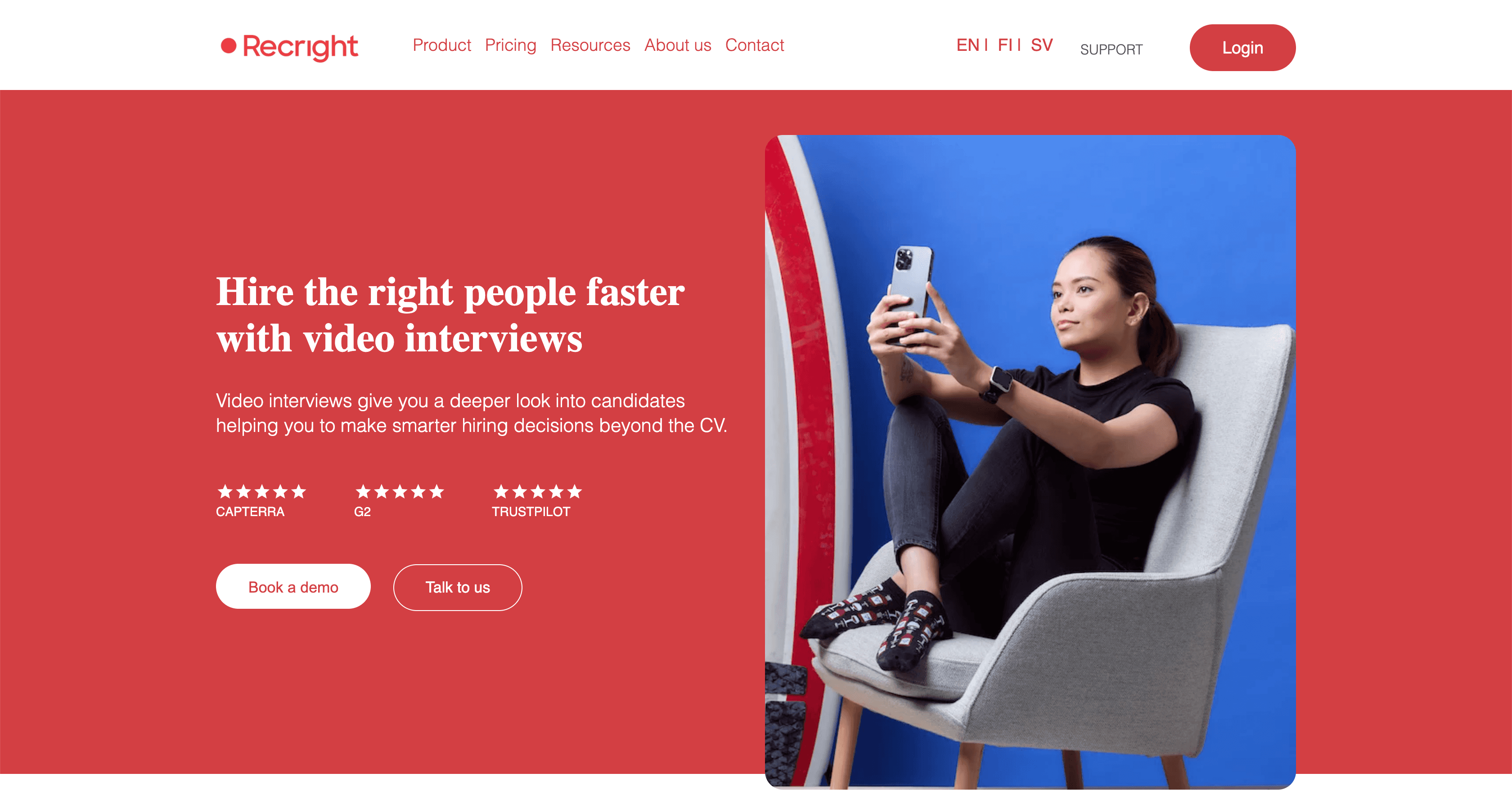
Overview & Core Offering
RecRight delivers a streamlined video interviewing platform focused on making recruitment more efficient through asynchronous interviews and collaborative hiring tools. The platform stands out for its user-friendly interface and comprehensive team collaboration features.
Key Features
- One-way and live video interviews
- Team collaboration tools
- Custom interview templates
- Mobile-optimized platform
- Multi-language support
- ATS integration capabilities
- Candidate self-scheduling
- Analytics and reporting
Pricing Structure
- Starter: $89/month
- Professional: $179/month
- Enterprise: Custom pricing
- Annual billing discounts available
Primary Use Cases
- Remote hiring processes
- Team-based recruitment
- High-volume screening
- International hiring
- Standardized assessments
Integration Capabilities
- Major ATS platforms
- Calendar systems
- Email integration
- API access
- SSO capabilities
Pros and Cons
✅ Pros
- Competitive pricing
- Strong collaboration tools
- Intuitive interface
- No candidate login required
- Good mobile experience
❌ Cons
- Limited advanced features in basic plan
- Some integrations require higher tiers
- Basic analytics in starter plan
Best Suited For
- Mid-sized companies
- Growing organizations
- Remote-first companies
- International businesses
- Team-based hiring processes
Customer Testimonial "RecRight has simplified our hiring process and made team collaboration seamless. The platform's ease of use for both recruiters and candidates has been a game-changer." - HR Director at a Tech Company
7. HireVue
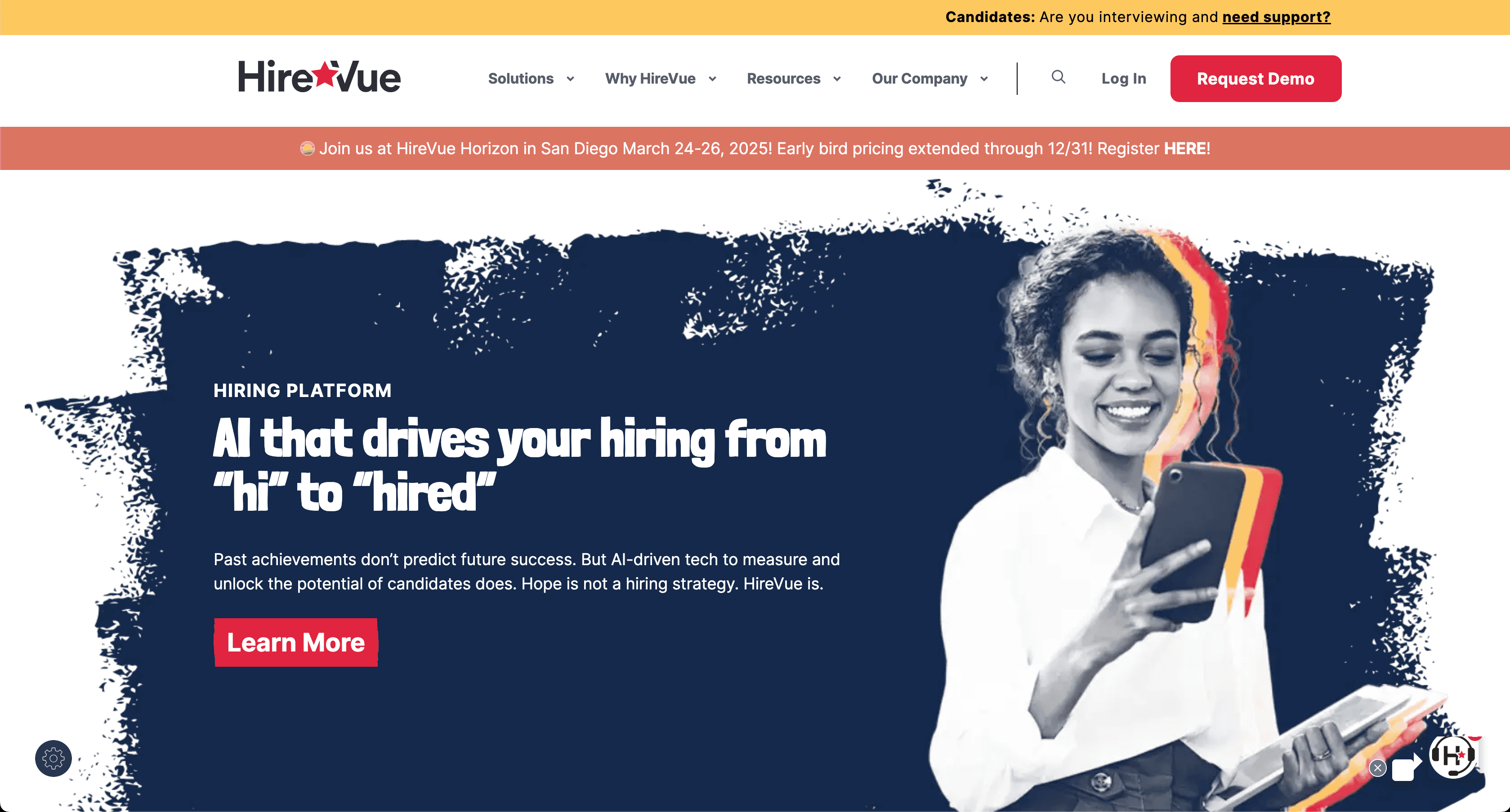
Overview & Core Offering
HireVue stands as an established enterprise video interviewing platform with advanced AI capabilities and global reach.
Key Features
- AI-driven evaluations
- Game-based assessments
- Global interview platform
- Advanced analytics
- Enterprise security
- Multi-language support
- Automated scheduling
Pricing Structure
- Enterprise pricing
- Custom solutions
- Volume-based options
- Global pricing available
Primary Use Cases
- Enterprise recruitment
- Global hiring
- High-volume screening
- Executive recruitment
- Campus recruiting
Integration Capabilities
- Enterprise ATS platforms
- Global HRIS systems
- Assessment tools
- Authentication systems
Pros and Cons
✅ Pros
- Enterprise-grade features
- Global capabilities
- Advanced AI
- Strong security
❌ Cons
- Premium pricing
- Complex setup
- Requires significant training
- Better for large organizations
Best Suited For
- Global enterprises
- Fortune 500 companies
- Large-scale recruiters
- International organizations
Customer Testimonial "HireVue's enterprise capabilities have supported our global hiring needs effectively." - Fortune 100 HR Executive
8. Jobma
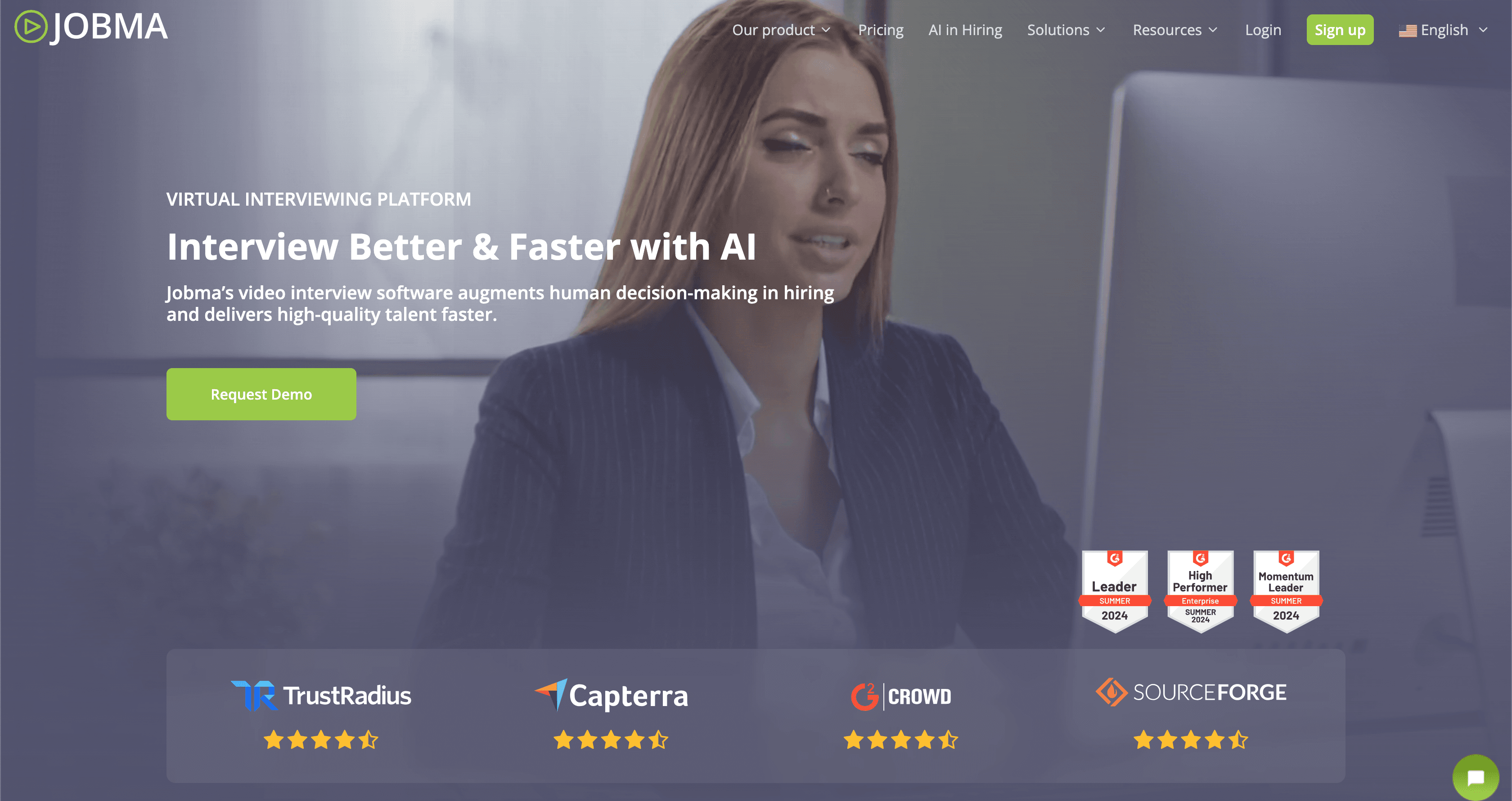
Overview & Core Offering
Jobma provides a comprehensive video interviewing solution with strong assessment tools and a focus on an excellent candidate experience.
Key Features
- One-way and live video interviews
- Skills assessment integration
- Candidate evaluation tools
- Custom branding options
- Interview scheduling
- Multi-language support
- Question bank library
Pricing Structure
- Basic: $79/month
- Standard: $159/month
- Premium: $249/month
- Enterprise: Custom pricing
Primary Use Cases
- Small to mid-sized businesses
- Technical hiring
- Skill-based assessment
- Agency recruitment
- Standardized hiring processes
Integration Capabilities
- Popular ATS integrations
- Assessment platforms
- Email notifications
- Calendar syncing
- Sharing capabilities
Pros and Cons
✅ Pros
- Good value for features
- Strong assessment tools
- User-friendly interface
- Comprehensive question library
❌ Cons
- Limited AI capabilities
- Basic analytics in lower tiers
- Some advanced features only in premium plans
Best Suited For
- Growing mid-sized companies
- Technical hiring teams
- Companies with standardized processes
- Organizations seeking good value
Customer Testimonial "Jobma's comprehensive skill assessment capabilities have transformed our technical hiring. The platform's ease of use and reasonable pricing made it an easy choice." - Technical Recruitment Manager
9. Hireflix
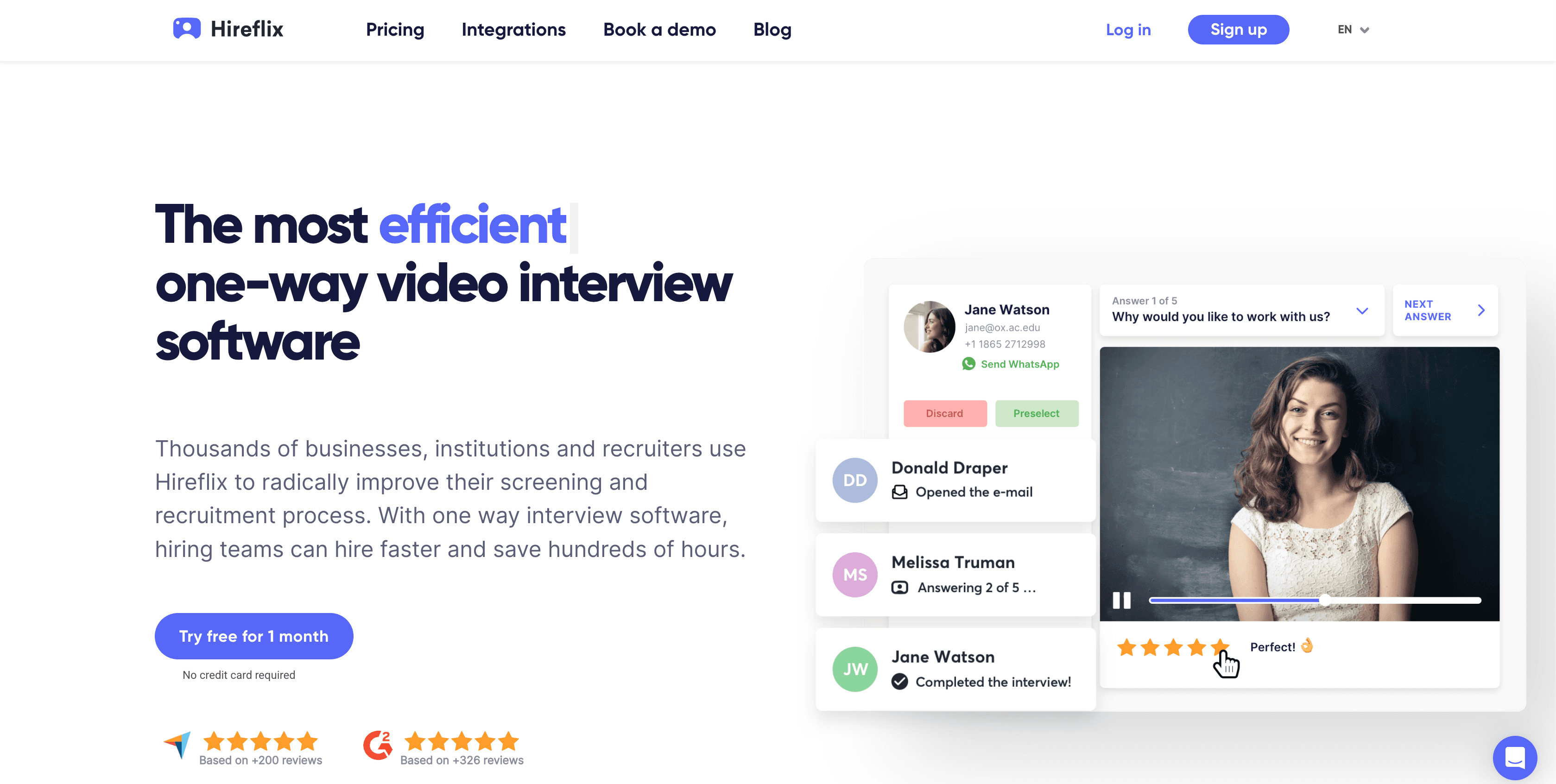
Overview & Core Offering
Hireflix focuses on simplicity and ease of use, making it ideal for companies new to video interviewing or those seeking a straightforward solution.
Key Features
- One-way video interviews
- Unlimited interview questions
- Simple sharing capabilities
- Basic team collaboration
- Mobile optimization
- Interview templates
- Customizable branding
Pricing Structure
- Teams: $75/month
- Business: $125/month
- Enterprise: Custom pricing
- Free trial available
Primary Use Cases
- Small businesses
- Startups
- Simple screening processes
- Initial adoption of video interviews
- Basic assessment needs
Integration Capabilities
- Limited ATS integrations
- Email notifications
- Basic sharing tools
- Calendar integration
Pros and Cons
✅ Pros
- Extremely user-friendly
- Quick implementation
- No software installation required
- Clean interface design
❌ Cons
- Limited advanced features
- Basic collaboration tools
- Minimal integrations
- Limited customization
Best Suited For
- Small teams
- First-time video interview users
- Companies with simple processes
- Budget-conscious organizations
Customer Testimonial "Hireflix provided exactly what we needed – a simple, effective way to conduct video interviews without complicated setup or training. Perfect for our small team." - Founder of a growing startup
10. Paradox
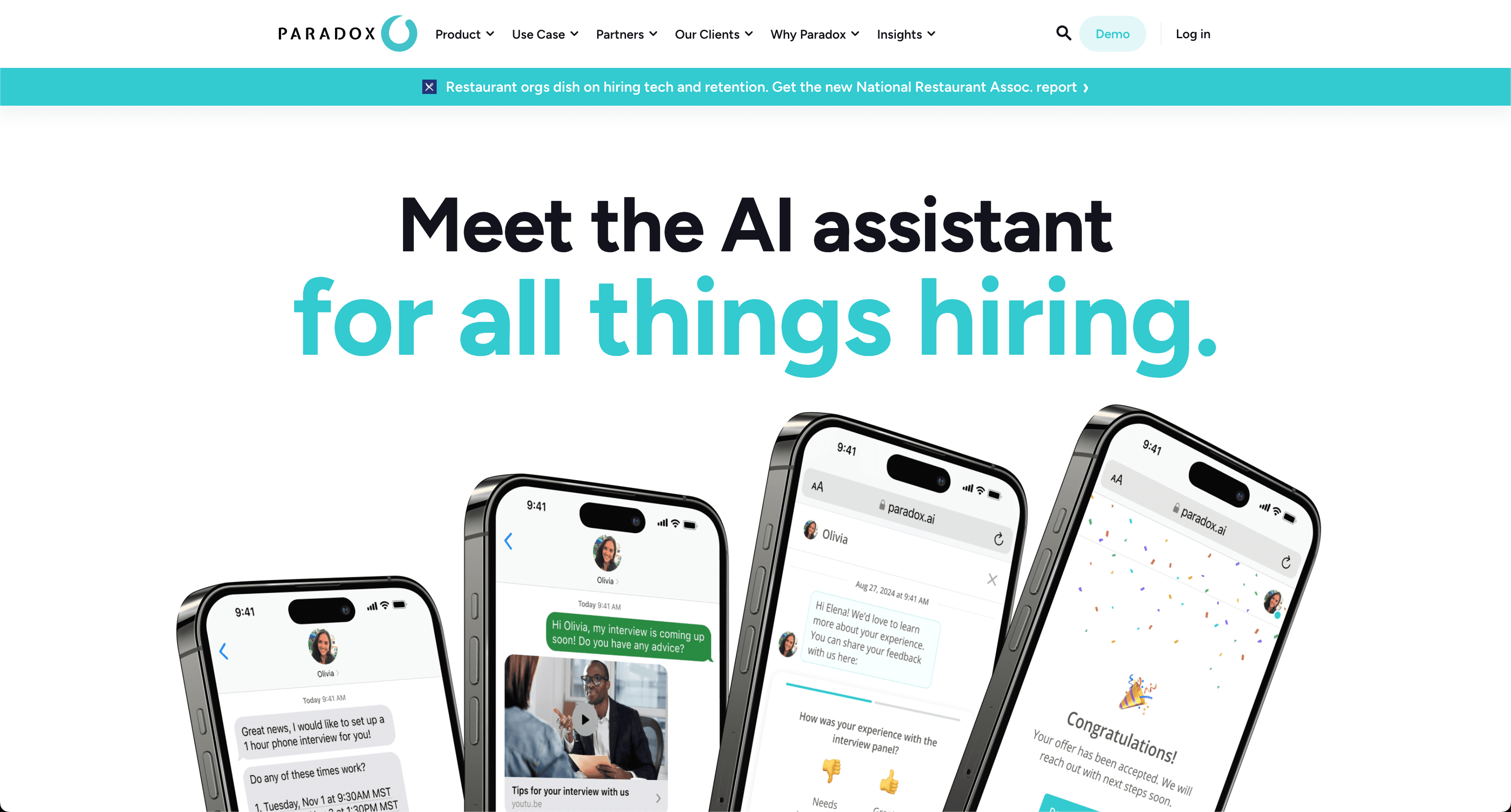
Overview & Core Offering
Paradox offers an AI-powered recruitment platform centered around its conversational AI assistant, Olivia, which automates candidate engagement, screening, and scheduling processes.
Key Features
- AI conversational assistant (Olivia)
- Automated screening and scheduling
- Multi-channel candidate engagement
- Mobile-first application process
- Event recruitment automation
- Video interview capabilities
- Candidate experience focus
Pricing Structure
- Custom pricing based on requirements
- Typical mid-market implementations start at $30,000/year
- Enterprise solutions available
- Annual contracts standard
Primary Use Cases
- High-volume recruiters
- Retail and service industry hiring
- Companies needing 24/7 candidate engagement
- Organizations with complex scheduling needs
- Event-based recruiting
Integration Capabilities
- Major ATS integrations
- HRIS systems
- Calendar platforms
- Communication tools
- Career site embedding
Pros and Cons
✅ Pros
- Excellent candidate engagement
- Strong scheduling automation
- Natural language processing
- Mobile-optimized experience
- 24/7 candidate interaction
❌ Cons
- Higher price point
- Limited video interview capabilities
- Complex setup process
- Requires integration expertise
Best Suited For
- High-volume recruiters
- Retail and service industry hiring
- Companies needing 24/7 candidate engagement
- Organizations with complex scheduling needs
Customer Testimonial "Olivia handles over 80% of our initial candidate interactions automatically. The platform has transformed our ability to manage high-volume hiring efficiently." - Robert Kim, Head of Talent Acquisition at RetailCorp
Feature Comparison Matrix
AI Capabilities Comparison
| Tool | AI Transcription | Resume Parsing | Candidate Matching | Automated Screening | Language Support |
|---|---|---|---|---|---|
| Hirevire | ✅ (90+ languages) | ❌ | ❌ | ✅ | Extensive |
| Spark Hire | ✅ | ✅ | ✅ | ✅ | Limited |
| VidCruiter | ✅ | ✅ | ✅ | ✅ | Moderate |
| myInterview | ❌ | ✅ | ✅ | ✅ | Basic |
| Willo | ❌ | ❌ | ❌ | ❌ | Basic |
| RecRight | ✅ | ❌ | ✅ | ✅ | Moderate |
| HireVue | ✅ | ✅ | ✅ | ✅ | Advanced |
| Jobma | ❌ | ✅ | ✅ | ✅ | Moderate |
| Hireflix | ❌ | ❌ | ❌ | ❌ | Basic |
| Paradox | ❌ | ✅ | ✅ | ✅ | Moderate |
Pricing Comparison (Starting Prices)
| Tool | Monthly Cost | Free Trial | Custom Enterprise |
|---|---|---|---|
| Hirevire | $19 | ✅ | ✅ |
| Spark Hire | $149 | ✅ | ✅ |
| VidCruiter | Custom | ✅ | ✅ |
| myInterview | Free/$39 | N/A | ✅ |
| Willo | $70 | ✅ | ✅ |
| RecRight | $89 | ✅ | ✅ |
| HireVue | Custom | ❌ | ✅ |
| Jobma | $79 | ✅ | ✅ |
| Hireflix | $75 | ✅ | ✅ |
| Paradox | Custom | ❌ | ✅ |
Implementation Best Practices
Successfully implementing pre-recorded video interviews requires thoughtful planning and execution. Follow these best practices to maximize adoption, efficiency, and results from your chosen platform.
Creating an Effective Implementation Strategy
Phased Rollout Approach
A strategic implementation plan increases the likelihood of successful adoption:
Initial Planning Phase
- Define clear objectives and success metrics
- Identify key stakeholders and secure buy-in
- Document current recruitment workflows
- Establish an implementation timeline
Pilot Program
- Select a specific department or role for initial implementation
- Choose enthusiastic early adopters as champions
- Configure the platform for this limited scope
- Collect detailed feedback and refine processes
Expansion Phase
- Gradually roll out to additional departments
- Apply lessons learned from the pilot
- Provide targeted training to new user groups
- Track adoption rates and address resistance
Full Integration
- Scale to organization-wide implementation
- Standardize processes across departments
- Integrate fully with existing systems
- Establish ongoing optimization protocols
Team Training and Adoption
Comprehensive training ensures successful platform utilization:
Recruiter Training
- Platform navigation and core functionality
- Question creation and interview design
- Candidate evaluation best practices
- Collaboration tools and sharing options
Hiring Manager Education
- Review process fundamentals
- Evaluation criteria consistency
- Feedback submission protocols
- Decision-making workflows
IT Team Preparation
- Technical requirements understanding
- Integration configuration
- Troubleshooting protocols
- Security compliance verification
Change Management
- Clear communication of benefits
- Regular updates on implementation progress
- Success story sharing
- Continuous feedback collection
Crafting Effective Video Interview Questions
Question Types and Structure
The quality of your questions directly impacts screening effectiveness:
Behavioral Questions
- Past performance indicators
- Specific situation examples
- Problem-solving approaches
- Team collaboration scenarios
Example: "Describe a situation where you had to adapt to a significant change at work. What actions did you take and what was the outcome?"
Technical Assessment Questions
- Skill verification inquiries
- Knowledge demonstration opportunities
- Problem-solving scenarios
- Tool proficiency confirmation
Example: "Please walk us through how you would troubleshoot a database performance issue, highlighting the key steps in your approach."
Cultural Fit Questions
- Work style preferences
- Value alignment exploration
- Team dynamics preferences
- Motivation and aspirations
Example: "What type of work environment brings out your best performance, and how do you adapt when the environment differs from your preference?"
Role-Specific Scenarios
- Job-relevant challenges
- Industry-specific situations
- Key responsibility scenarios
- Decision-making examples
Example: "Imagine you're managing a project that's falling behind schedule. Walk us through your approach to getting it back on track while maintaining quality."
Question Formulation Best Practices
Follow these guidelines to create effective pre-recorded video questions:
Clarity and Brevity
- Keep questions concise and specific
- Avoid complex, multi-part questions
- Use simple, direct language
- Eliminate ambiguity
Structure and Format
- Begin with easier questions to build comfort
- Progress to more complex inquiries
- Group related questions together
- Balance question types
Time Allocation
-
Match time limits to question complexity
-
Typical ranges:
-
Simple questions: 60-90 seconds
-
Moderate complexity: 2-3 minutes
-
Complex scenarios: 3-5 minutes
Consistency and Fairness
- Ask all candidates the same core questions
- Use standardized evaluation criteria
- Avoid potentially biased language
- Focus on job-relevant inquiries
Evaluating Candidate Responses
Structured Evaluation Framework
Establish consistent assessment criteria to ensure fair evaluation:
Scoring System Development
- Create clear evaluation rubrics
- Define rating scales (e.g., 1-5)
- Weight criteria based on importance
- Document scoring guidelines
Evaluation Categories
- Communication effectiveness
- Problem-solving approach
- Technical competency
- Cultural alignment
- Role-specific knowledge
Collaborative Assessment
- Involve multiple evaluators
- Collect independent ratings before discussion
- Resolve score discrepancies systematically
- Document consensus reasoning
Response Analysis Best Practices
These techniques help extract maximum value from candidate responses:
Content Evaluation
- Assess completeness of answers
- Look for specific examples and details
- Evaluate structure and organization
- Note relevance to the question asked
Communication Assessment
- Clarity of expression
- Logical flow of ideas
- Engagement and enthusiasm
- Professional presentation
Red Flag Identification
- Vague or generic responses
- Inconsistencies with resume or application
- Difficulty articulating relevant experiences
- Negative language about previous employers
Green Flag Recognition
- Specific, relevant examples
- Structured, thoughtful responses
- Evidence of preparation
- Authentic enthusiasm
Team Collaboration in the Review Process
Efficient Review Workflows
Optimize how your team evaluates and discusses candidates:
Review Assignment
- Distribute responses based on expertise
- Establish clear review timelines
- Set expectations for feedback detail
- Create accountability for timely reviews
Collaborative Evaluation
- Share response access with relevant stakeholders
- Implement structured feedback collection
- Establish evaluation priorities
- Set up regular consensus meetings
Decision-Making Protocol
- Define clear advancement criteria
- Establish decision authority
- Document selection rationale
- Create feedback loops for process improvement
Technology Utilization
Leverage platform features to enhance team collaboration:
Shared Access Management
- Configure appropriate user permissions
- Set up team workspaces
- Establish notification protocols
- Create collaborative dashboards
Comment and Feedback Tools
- Use timestamped comments for specific responses
- Implement standardized feedback forms
- Create evaluation templates
- Enable comparative analysis
Rating Consolidation
- Aggregate team evaluations
- Identify scoring discrepancies
- Calculate weighted averages
- Generate candidate ranking reports
Measuring Implementation Success
Key Performance Indicators
Track these metrics to evaluate your pre-recorded video interview implementation:
Efficiency Metrics
- Time-to-screen reduction
- Time-to-hire improvement
- Recruiter productivity increase
- Interview completion rates
Quality Indicators
- Candidate quality scores
- Hiring manager satisfaction
- First-year retention rates
- Performance of new hires
Experience Measures
- Candidate feedback scores
- Completion rates
- Dropout analysis
- User adoption metrics
Cost Analysis
- Cost-per-hire reduction
- Recruitment resource allocation
- Agency fee reduction
- ROI calculation
By following these implementation best practices, organizations can maximize the benefits of pre-recorded video interviewing while creating a consistent, effective, and fair screening process.
Conclusion: Choosing Your Ideal Pre-Recorded Video Interview Solution
As we've explored the landscape of pre-recorded video interview tools in 2025, it's clear that the right choice depends heavily on your organization's specific needs, size, and recruitment goals. Let's summarize the key takeaways to help you make an informed decision.
Key Decision Factors
For Startups and Small Businesses
If you're a startup or small business, your priorities likely include:
- Cost-effectiveness is crucial
- Easy implementation is essential
- Basic but reliable features are sufficient
- Flexibility in scaling up or down
- Simple integration requirements
Tools like Hirevire and myInterview stand out in this category, offering excellent value without overwhelming complexity. Hirevire's $19/month starting price and extensive integration options make it particularly attractive for growing organizations seeking maximum value.
For Mid-Sized Companies
Mid-sized organizations typically require:
- Balance of features and cost
- Moderate customization needs
- Team collaboration capabilities
- Integration with existing systems
- Room for growth
Solutions like RecRight, Jobma, and Willo provide the right mix of functionality and scalability for growing organizations. These platforms offer sufficient features to support structured hiring processes while maintaining reasonable pricing structures.
For Enterprise Organizations
Large enterprises need solutions that offer:
- Advanced features and analytics
- Global capabilities
- Extensive customization options
- Enterprise-grade security
- Comprehensive support
HireVue and VidCruiter offer the robust features and security needed for large-scale operations, though at a premium price point that reflects their enterprise focus.
Making the Final Choice
Consider these steps when making your decision:
Evaluate Your Current Needs
- Assess your hiring volume
- Review your budget constraints
- List must-have features
- Consider team capabilities
- Examine integration requirements
Plan for Future Growth
- Anticipate scaling needs
- Consider potential feature requirements
- Account for team expansion
- Factor in geographic expansion
- Budget for future investments
Test Before Committing
- Take advantage of free trials
- Run pilot programs
- Gather team feedback
- Test candidate experience
- Evaluate support quality
Final Recommendations
Based on our comprehensive analysis:
Best Overall Value: Hirevire
- Excellent price-to-feature ratio starting at only $19/month
- User-friendly interface for both recruiters and candidates
- Comprehensive integration options with 5000+ apps
- Strong multi-format capabilities including video, audio, and file responses
- No login required for candidates, enhancing completion rates
- Advanced language support with 90+ languages
- Flexible scaling options suitable for growing organizations
Best for Enterprise: HireVue
- Advanced AI capabilities
- Global reach
- Comprehensive features
- Enterprise-grade security
- Extensive customization
Best for Quick Implementation: myInterview
- Easy setup
- Intuitive interface
- Basic but effective features
- Affordable pricing
- Good support
Best for Structured Hiring: VidCruiter
- Comprehensive workflow tools
- Strong compliance features
- Advanced customization
- Detailed analytics
- Robust security
Remember that the "best" solution is the one that aligns with your specific needs, budget, and growth plans. Consider starting with a pilot program of your chosen solution before making a full commitment, and ensure you have buy-in from all stakeholders in the recruitment process.
The future of recruitment is increasingly digital and automated, but the human element remains crucial. The ideal pre-recorded video interview tool should enhance, not replace, your team's ability to identify and engage with top talent.
The Impact of Pre-Recorded Video Interviews on Modern Recruitment
As organizations continue to embrace these technologies, we're seeing several emerging trends:
- Increased candidate reach across geographical boundaries
- More efficient screening processes that save considerable time and resources
- Improved decision quality through standardized evaluation
- Enhanced candidate experience with flexible, convenient interviewing options
- Better team collaboration in evaluation and selection
By leveraging the right pre-recorded video interview platform, organizations can transform their recruitment process from a time-consuming burden into a strategic advantage that delivers better hires faster and more efficiently.
Frequently Asked Questions About Pre-Recorded Video Interview Tools
General Questions
Q: What is a pre-recorded video interview tool?
A: A pre-recorded video interview tool (also called asynchronous or one-way video interviewing) is a software solution that allows candidates to record responses to predetermined questions at their convenience. Recruiters can then review these responses at any time, eliminating the need for scheduling coordination.
Q: How much do pre-recorded video interview tools typically cost?
A: Pricing varies significantly based on features and scale:
- Entry-level solutions: $19-50/month
- Mid-tier solutions: $70-150/month
- Enterprise solutions: Custom pricing, typically $500+/month Some platforms like myInterview offer free tiers for basic features.
Q: Can pre-recorded video interview tools integrate with existing ATS systems?
A: Yes, most modern pre-recorded video interview tools offer integration capabilities. Platforms like Hirevire provide multiple integration options through Zapier (5000+ apps) and Make (2000+ apps), ensuring compatibility with most existing systems.
Technical Considerations
Q: Do candidates need to install special software?
A: No, most modern pre-recorded video interview tools are web-based and work directly in the browser. For example, Hirevire requires no login or software installation for candidates, making it extremely accessible.
Q: What about data security and privacy?
A: Reputable pre-recorded video interview tools prioritize security and compliance:
- Data encryption
- GDPR compliance
- Secure video storage
- Access control
- Regular security audits
Q: How do these tools handle different languages?
A: Many platforms offer multilingual support. For instance, Hirevire provides AI transcription for 90+ languages, interface localization, and global accessibility features.
Implementation and Usage
Q: How long does it take to implement a pre-recorded video interview tool?
A: Implementation time varies by platform:
- Basic platforms: 1-2 days
- Mid-tier solutions: 1-2 weeks
- Enterprise systems: 2-4 weeks or more Factors include integration requirements, team training needs, and customization levels.
Q: Can I customize the screening questions?
A: Yes, most platforms allow customization of:
- Interview questions
- Assessment criteria
- Evaluation frameworks
- Response formats
- Branding elements
Q: What happens if a candidate has technical issues?
A: Most platforms provide:
- Technical support resources
- Multiple recording attempts
- Connection stability checks
- Alternative submission methods
- Customer support access
ROI and Benefits
Q: How much time can these tools save?
A: Organizations typically report:
- 50-70% reduction in screening time
- 30-40% decrease in time-to-hire
- 60% reduction in scheduling coordination
- Improved quality of hire metrics
Q: Can pre-recorded video interview tools help reduce bias in hiring?
A: Yes, through several mechanisms:
- Standardized questions for all candidates
- Consistent evaluation criteria
- Blind screening options
- Structured interview formats
By implementing the right pre-recorded video interview platform and following best practices, organizations can transform their recruitment process, making it more efficient, effective, and candidate-friendly while improving the quality of their hires.